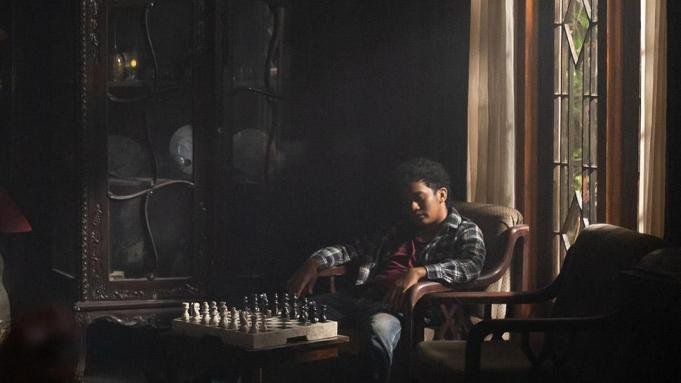‘Autobiography’ REVIEW: Solid debut on the downside of power and loyalty
‘Autobiography’ REVIEW: Solid debut on the downside of power and loyalty
Kevin Ardilova as Rakib.
This review contains spoilers on Autobiography (2022)
Be careful on who you trust.
Obedience and loyalty: two of core values taught among Asian people. When a special bond between lords and peasants is formed, it is often admired and romanticized. There are peasants who kiss the ground their lords walk on daily for the lords provide them everything they need. However, the rapport you build with your boss doesn't eliminate the massive gap in between. They still hold an overwhelming amount of power over you. Lords will let their henchmen taste a lick of their power, with the caveat of possibly selling your soul to the devil. Your close proximity to their power that allows you to have a similar amount of recognition and power over people pleases your ego until that very same power destructs you and your conscience consumes you due to the consequences that comes with that power.
Makbul Mubarak, an Indonesian film critic, fills in the writer-director's shoes with his debut feature film Autobiography. This stylistic crime thriller follows a young man named Rakib (Kevin Ardilova) who inherits his father's job as a housekeeper and assistant to a retired general Purna (Arswendy Bening Swara) after his father was put behind bars. The events that follow sees Purna running for mayor and his whole election campaign. It is polished and stellar, which is quite unique in debut films. The writing is sharp, well-developed and filled with allegories that touch on Indonesia’s political history. It is very much a product of its home country. Due to similarities in customs and social issues presented in the film, other Southeast Asian audiences might find the film hitting close to home. To us Filipinos, a strong figurehead like Purna is akin to the strict, macho leaders who served the country over the years.
It is called Autobiography for a reason. It paints a raw and harsh portrait of a deeply complex man and his relationship with his servant: a mirror of Indonesia's long history of military dictatorship. The retired general Purna, all alone in his estate, longs for a son to take care of and with young Rakib’s father (who is also Purna’s servant) in jail, he takes him under his wing. He never saw him as that immediately. Only when their rapport grew closer, with Purna seemingly preparing him to be his successor at first glance. The film slowly builds up their relationship through scenes solely focusing on them. He teaches him his perspectives in life, gives him his old clothes (and remarks how much he looks just like him when Purna is younger) and trains him how to shoot and hunt. But the power dynamic is still there: Purna as The General and Rakib as his soldier and Sergeant (the nickname the neighbors gave him after he got closer to Purna). He is being molded into an obedient follower, not to be his eventual equal. Hierarchy is observed in the Eastern culture and elders are meant to be respected. Rakib sees Purna as his elder and boss, and has to say yes at his every command as a sign of respect and loyalty. He is blinded by his kindness and never sees how his power really incite fear rather than respect. He acquired some respect among his peers due to his association with the retired general. He sees this as beneficial that would advance his life. But most of the time he uses this privilege, it is for Purna's sake. He never had to track down who vandalized his campaign poster, but his desperation to keep his strong bond with Purna motivated him to do so.
Purna, played by Arswendy Bening Swara, campaigning for the mayoral position in a small town.
Due to his reputation, Purna's presence strikes fear among people. There are those who detest him, yet choose to remain silent. All the dissidents are put down like rabid dogs. When the story takes an even dreadful turn after Agus's demise, Rakib’s conscience is shaken for he is now an accessory to a crime. He shouldn't've pursued and taunted him in the first place. What Agus did is reasonable, for Rakib's father was fighting for the very same thing as well that led him into prison. His father, however, advised him to lay low and live a comfortable life under Purna so as to not put him in any danger. His overwhelming guilt panics him into trying to find avenues of escape. He is unsuccessful every time unfortunately. It is as if he is being observed under a microscope for every move he makes, Purna is one step ahead. Rakib is now turned into a helpless child functioning under the fear of his father. Purna calls his mansion as Rakib's home as well, but at this point of the story it turned into a prison. Purna bathes him just to make sure he wouldn't scheme behind his back. His kind deeds always have dark motives underneath and it's becoming so clear in Rakib's head.
Rakib, driven by his desire to escape and get rid of the guilt he has, finally devised a plan that could work for the rest of the town. In a tense and outstanding third act that keeps you on the edge of your seat, Purna finally gets his overdue comeuppance. He knew that the only way to beat him was to finally face him. Chess is a game of power and after many losses, Rakib as a pawn finally bested him and took him down by knowing his fragility: hints of defiance against him.
Arswendy Bening Swara's performance as Purna is a masterclass in subtlety. Bening Swara exhibits Purna's presence quite effortlessly through his subtle yet terrifying glances that bring horror to people and line deliveries that are filled with power and assertiveness. He can be the kindest father figure to a young man and switch to being the vilest man in just a manner of seconds, all while still maintaining an unbothered composure. He is the beast that holds young Rakib captive and Kevin Ardilova's performance captures his moral journey and turmoils magnificently. His emotions radiate through the screen and in turn, the audiences get invested in his development from being an impressionable and innocent young man to a disillusioned servant who wishes to break free during the course of the movie. The last shot of his close-up is just haunting that stays in you for a long time.
As a director, Mubarak moves with purpose and plans with precision. His skills aren’t green. Years after he attained his film degree, he finally made a full length feature and not only did he cast such an amazing group of actors but assembled a crew filled with skilled professionals for his feature debut as well. Every element of the film, from its writing to its pacing, are well-thought out. Wojciech Staron’s cinematography is full of personality. It is murky and stylish with intent. The look of the film is very reminiscent of recent grim Hollywood thrillers. Its lighting tells a story and mirrors our leads’ paths during the course of the film. Particularly, the use of red lighting increased during the duration of the film to depict the severity of the scenes moral-wise. Handheld shots are used but only on scenes that deem it necessary to suggest unease and panic. Most of the time it is steady and lingers on long shots. With the deliberate and slowburn editing of Carlo Francisco Manatad (which explains Film Development Council of the Philippines’ participation in this film), these moments are filled with simmering tension underneath. In the scenes of heightened paranoia and overwhelming guilt, either intentional cuts, when Agus’s life is on thin ice, or unedited long tracking shots, when Rakib rushes out of the hospital, are used effectively. These scenes are accompanied with Bani Hykal's electrifying score and a heightened sound design by Hadiranus Eko Suno that further define the film's overall mood and immerse you in the bleak and atmospheric setting of the film.
It brings nothing subversive to the political thriller genre, not that it's a bad thing. It follows a structure that is typical in this genre of filmmaking. Its overall look and mood are in the similar vein of thrillers made by Western filmmakers, with an Asian sensibility and a slow burn pacing. What makes Autobiography stand out in this year's releases, however, is its coherency and consistency in its quality from beginning until the end. It excelled in all departments and that should be enough reason to deem it worthy of a watch. After watching this, it is no surprise that it won the Orizzonti FIPRESCI Prize at the 79th Venice Film Festival and recently Best Original Screenplay at the Festival Film Indonesia 2022. It is a truly profound and riveting film and deserves the attention it is receiving.
Autobiography is among the films under Asian Next Wave Competition category of QCinema International Film Festival 2022. The film won Asian Next Wave Best Film and Makbul Mubarak won Best Director during the award ceremony held on November 23, 2022.







![‘SEVENTEEN World Tour [Be the Sun]’ REVIEW: Time’s role in building identity and community in music](https://images.squarespace-cdn.com/content/v1/603206e1372b9903d47694fa/c5520cb3-a3ac-4ebc-9365-c561c47e883b/Charlie+Vitug_REVIEW_SEVENTEEN_PICTURE+1.jpg)







